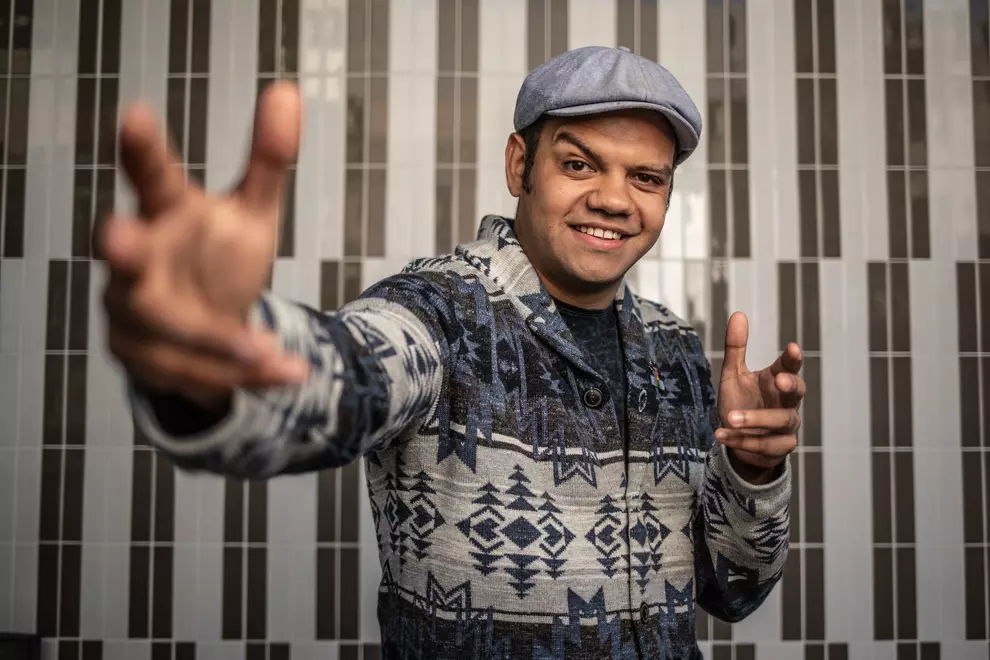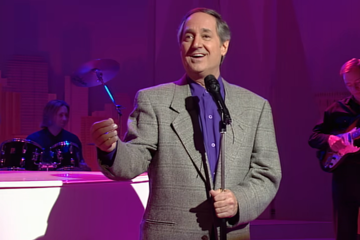Wongutha-Yamatji man Meyne Wyatt grew up on country in Kalgoorlie in Western Australia, before moving to Sydney to study at NIDA. He’s since embarked on an accomplished stage and screen career, earning theatre accolades, starring in Redfern Now, and becoming the first Indigenous main cast member on Neighbours in 2014. Wyatt also featured in STC’s King Lear in 2015, mere months after his father passed away from throat cancer.
Wyatt brings his debut play City Of Gold to Queensland Theatre and Sydney’s Griffin Theatre – and there are some parallels between the work and his own life. The production, in which he also stars, is billed as following young Indigenous man and budding actor, Breythe, as he returns home to Kalgoorlie in the wake of his father’s death.
For Wyatt though, the play is only “semi-autobiographical”. “I'm an actor, so there's a character in the play that is an actor, who lives in Sydney and then he goes back to Kalgoorlie,” Wyatt begins.
“The character's father dies, and my father died in 2015. So there's all of those parallels with myself and the play. Just exploring what happens once someone passes away in your family and having to deal with the funeral and having to deal with the family, I think mostly that’s the semi-autobiographical nature of the play.”
Don't miss a beat with our FREE daily newsletter
An actor with a score of credits, including his film debut in 2012’s The Sapphires and the 2018 TV spin-off series, Mystery Road, Wyatt says he knew he always wanted to write at some point in his career.
“I always thought it was gonna be maybe a little bit later when I was further down the track, but I decided at one point, when is a good time to write something? So I just started to do it while I was in the midst of doing other things, acting in other productions, other shows, TV and films and stuff like that.”
He started writing City Of Gold about a year and a half after his father’s death, but he didn’t land on the intimate subject matter straight away. He went into the process writing about something “that was away from myself”, but admits, “I read it back and I particularly didn’t think it was very good.”
So he took the advice often bestowed on new writers: write what you know. “I went back to the drawing board and just went, 'Ok, well, what's happened in my life that I wanna talk about?' I think stuff that was more truthful to me and stuff that I experienced was just better in the end.”
“I think this had become a sort of healing process in a way. It was a cathartic experience writing the play."
That honest way of writing helped people to connect with the work – “people seemed to respond to the material” – even as it was, for him as a playwright, a “cathartic experience”: “I think this had become a sort of healing process in a way. It was a cathartic experience writing the play. I think there were certain things I divulge in, that I haven't been shy from writing about, because I think it ended up helping me go through the grieving process.”
Still, it’s not meant to be a study of his own grief. Instead, Wyatt describes it as “a play about a family going through grief set in Kalgoorlie and dealing with the contemporary social climate of Australia today and what that means for Indigenous Australia and non-Indigenous Australia”.
Wyatt says that he drew upon experiences from his life – whether racism at school, or upon entering the creative arts industry in Sydney – to write about those social issues. He notes that when he was starting out as an actor he’d only be considered for certain roles, a subject that he explores in City Of Gold.
“Especially when I first graduated from acting school when I came into the industry, there were certain roles that I'd only be seen for and auditioned for and the roles that I ended up getting.
“I think that they were a reflection of my identity, but I think that I had to push some of those boundaries and make sure I forced the door open so that people could see that I was an actor, not just an Indigenous actor.”
Ultimately, Wyatt’s goal with the work isn’t proscriptive – there’s no direct message, he says, he simply wants to spark difficult conversations for his audience.
“I think there's a conversation about change in the play – I think my question to an audience is, 'What do you think about that?' I think that this is a play that I'm sure people will make direct questions from the play, like 'Oh, what can I do?' or 'What is he saying here?' but I feel like you take out what you get from the play and what I'm talking about.
“Some of those things, I address them because it's just what happens and this is real life and I'm trying not to shy away from the dirtiness of that.”
















